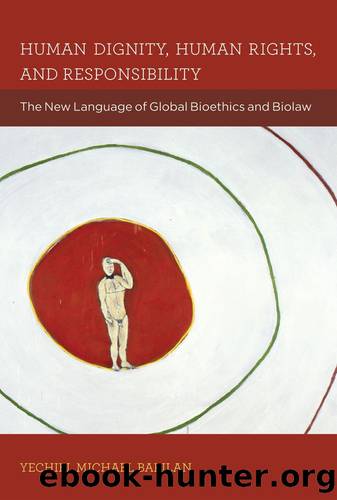Human Dignity, Human Rights, and Responsibility: The New Language of Global Bioethics and Biolaw (Basic Bioethics) by Barilan Yechiel Michael

Author:Barilan, Yechiel Michael
Language: eng
Format: epub
Publisher: The MIT Press
Published: 2012-09-13T16:00:00+00:00
The idea of “manifesto rights” shows that a right can be action-guiding even when no agent is in a position to perform a sequence of actions that would result in enjoyment of the substance of the right for those deprived. (Beitz 2009, 121)
Let’s examine what “action guiding” might mean. Imagine a poor and dying girl in the jungle. Her situation is a human rights crisis. It is evident that if an expedition finds her and takes care of her, this expedition promoted human rights; if the expedition chose to save a few rare monkeys instead, it would be evident that the expedition violated the human rights of the girl. Whatever other duties the expedition might have (e.g., grants to research and save monkeys in threat of extinction), everything changes once an acute and remediable human-rights crisis emerges.
Human rights are a strange phenomenon indeed, as they strive to achieve legal recognition (i.e., agent-centered formulations) for a moral idea that is not readily compatible with legal formulations (i.e., recipient-centered ethics). Indeed, when laws and contracts address rights, they do so only after frameworks of agencies have been established (e.g., rental contracts specifying the mutual rights and duties of landlord and tenant). This anomaly of human rights is worth the trouble because of its motivational clout and clear focus. When human rights are at stake, we are compelled to look beyond bureaucratic, practical, legal, and agency frameworks and move to create responsibilities that may alter or even infringe upon existing ones; this is because what really counts is the protection and promotion of the substance of human rights.
Contracts and Promises
As an enforceable instrument that guides action, one may conceive of human rights as encompassing special kinds of commitments. So at this stage I wish to distinguish between two kinds of commitments—contracts and promises.
Aristotle wrote that certain promises should be observed as a matter of character and regardless of considerations of justice and harm (Nicomachean Ethics, 1127a–b). Thomas Aquinas held that although many promises are not enforceable, they are morally binding. Nonetheless, the obligation of the promise is part of the larger order of morality (Summa Theologica, 2.2, 88, 3). Although I start with these observations, my analysis cuts the pie of obligation differently from contemporary academic literature in at least two significant ways. I distinguish between interests protected by human rights and other interests, and I wish to accommodate pluralistic conceptualizations of obligation, duties, agreements, and similar normative concepts (Shiffrin 2006–2007; Pratt 2007; Gilbert 2004; Benson 2001; Kessler 1994–1995 and the sources they cite).
I define a contract as being an enforceable commitment. This means that entrance into a contract always entails agreement to recede personal power and discretion regarding the contents of the contract, and advance acceptance of the interpretation of the contract by a rational and just authority operating within a broader framework of law, order, and justice. It is impossible to have a contract whose formulation, logical structure, and content are principally beyond arbitration and enforcement.
A promise is a commitment without acceptance of enforcement.
Download
This site does not store any files on its server. We only index and link to content provided by other sites. Please contact the content providers to delete copyright contents if any and email us, we'll remove relevant links or contents immediately.
When Breath Becomes Air by Paul Kalanithi(7256)
Why We Sleep: Unlocking the Power of Sleep and Dreams by Matthew Walker(5637)
Paper Towns by Green John(4165)
The Immortal Life of Henrietta Lacks by Rebecca Skloot(3821)
The Sports Rules Book by Human Kinetics(3582)
Dynamic Alignment Through Imagery by Eric Franklin(3482)
ACSM's Complete Guide to Fitness & Health by ACSM(3460)
Kaplan MCAT Organic Chemistry Review: Created for MCAT 2015 (Kaplan Test Prep) by Kaplan(3419)
Introduction to Kinesiology by Shirl J. Hoffman(3297)
Livewired by David Eagleman(3116)
The River of Consciousness by Oliver Sacks(2989)
Alchemy and Alchemists by C. J. S. Thompson(2909)
The Death of the Heart by Elizabeth Bowen(2896)
Descartes' Error by Antonio Damasio(2728)
Bad Pharma by Ben Goldacre(2724)
The Gene: An Intimate History by Siddhartha Mukherjee(2488)
Kaplan MCAT Behavioral Sciences Review: Created for MCAT 2015 (Kaplan Test Prep) by Kaplan(2486)
The Fate of Rome: Climate, Disease, and the End of an Empire (The Princeton History of the Ancient World) by Kyle Harper(2430)
The Emperor of All Maladies: A Biography of Cancer by Siddhartha Mukherjee(2427)
